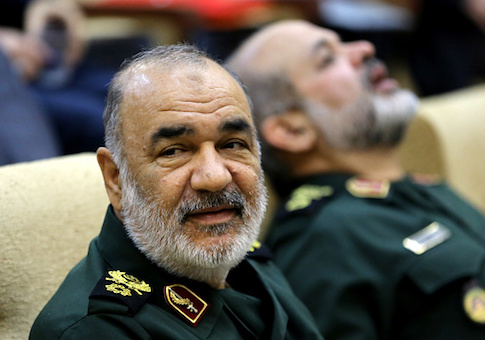Iran has appointed as the next head of its Revolutionary Guards Corps, or IRGC, a veteran fighter who spearheaded a series of policies to develop advanced missiles capable of "annihilating" Israel, an announcement that comes just weeks after the Trump administration designated the entire IRGC as a terrorist entity.
Over the weekend, Iran announced that Maj. Gen. Hossein Salami would be promoted as the next head of the IRGC, replacing Maj. Gen. Mohammad Ali Jafari.
Salami, during his time in the IRGC and Iranian military leadership, was the architect of a massive buildup in Iran's advanced ballistic missiles, primarily ones that Salami has bragged are capable of "annihilating" Israel. Salami also worked to implement policies that enabled Iran to camouflage its contested nuclear weapons work from international inspectors.
The appointment of Salami is meant to solidify Iranian Supreme Leader Ali Khamenei's hardline agenda, according to U.S. officials and regional experts, who told the Washington Free Beacon that Tehran has no desire to halt its regional terror operations in hotspots such as Yemen, Syria, and Lebanon.
Salami has built a record of issuing threats of destruction to Israel and was behind a 2016 efforts by the Islamic Republic to boost its missile production in areas such as Lebanon, where they could easily strike the Jewish state.
"Today, more than ever, there is fertile ground—with the grace of God—for the annihilation, the wiping out and the collapse of the Zionist regime," Salami said in 2016.
"In Lebanon alone, over 100,000 missiles are ready to be launched," he warned. "If there is a will, if it serves [our] interests, and if the Zionist regime repeats its past mistakes due to its miscalculations, these missiles will pierce through space, and will strike at the heart of the Zionist regime. They will prepare the ground for its great collapse in the new era."
Salami has maintained at several junctures that Iran will never moderate its rhetoric against Israel and remains committed to its destruction.
"Iran's policies towards the terrorist groups and the Zionist regime will not change, and this regime will be vanished from the global political scene," Salami said in 2015.
Salami also has been the face of Iranian efforts to stop international nuclear inspectors from obtaining access to key military sites that once housed the regime's nuclear weapons program. Many of these sites continue to be shrouded in mystery.
"We'll not let them even watch the doors of the sites," Salami stated in 2017, as the issue of Iran's nuclear sites garnered international attention.
"Both the great Iranian nation and the U.S. and the world should know that if there is only one demand in the whole world which will be rejected and if there is only one wish that will be taken to the grave, it is the Americans' demand to visit our military centers," Salami maintained at the time.
As with his predecessor, Salami is likely to continue ratcheting up the country's anti-American military rhetoric.
"The U.S. power is declining given its wrong interfering policies but its threats still continue," Salami said during a 2017 interview.
U.S. officials who work on the Iran sanctions issue told the Free Beacon that Salami is yet another hardline mouthpiece who seeks to advance Tehran's global terror operations.
"Iran has been bluffing for two years that they're going to retaliate directly against the United States for exiting the nuclear deal and increasing pressure, including for designating the IRGC," said one senior congressional. "They've backed down every time, and they'll keep backing down, because there's just not much they can do. But [previous IRGC commander] Jafari was starting to look a little silly because of the constant empty threats, so the supreme leader apparently decided to install someone new to bluff."
Behnam Ben Taleblu, a senior fellow and Iranian security expert at the Foundation for Defense of Democracies, told the Free Beacon that Salami's appointment is meant to solidify Khamenei's hardline policies, particularly those towards the U.S. and Israel.
"Salami will likely provide the necessary rhetorical heft that the IRGC needs to escalate in word but not in deed against Washington as Tehran seeks to weather the storm caused by the reinstatement of sanctions once waived by the nuclear deal," Ben Taleblu said.
"Salami's appointment follows the recent addition of the IRGC to the FTO list by the U.S. State Department, and Salami himself has already been sanctioned by the U.S. Treasury Department in 2007 and remains on an EU sanctions list until 2023," he said. "While focusing on the new leader of the IRGC is important, for those interested in the men who have underwritten the Guard Corps' lethality, what's next for [former IRGC leader] Jafari also matters."
"One thing however, is clear," Ben Taleblu said. "That the recent game of musical chairs within the IRGC proves that no matter how powerful the Guard Corps or any other organization becomes, it is the Supreme Leader who sits atop Iran's power structure and with ultimate authority on national security matters."
Meanwhile, the Trump administration announced on Monday that it would no longer be granting sanctions waivers to a host of countries that continue to purchase Iranian crude oil.
The move is meant to further choke Iran's already ailing economy and has won plaudits from Iran hawks on Capitol Hill, many of whom have been challenging the Trump administration to take a more forceful approach to their sanctions policy.
The State Department has yet to decide whether it will issue a separate set of sanctions waivers that have allowed Tehran to continue engaging in sensitive nuclear work at several sites, including one that once housed the regime's nuclear weapons program.
